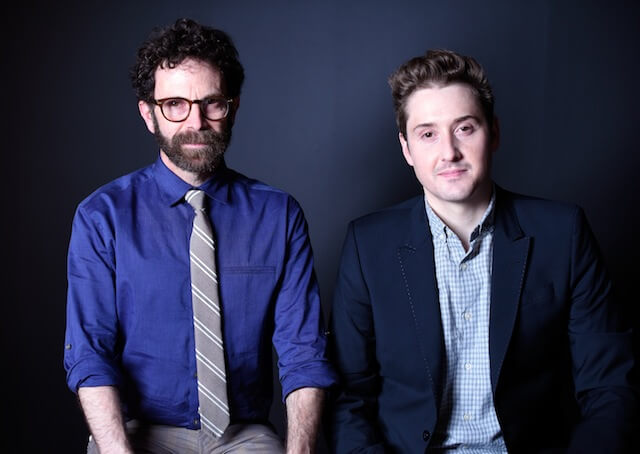Charlie Kaufman is smiling and joking. That’s not the same as being upbeat, and as we — plus Duke Johnson, the “Being John Malkovich” creator’s cohort on his new film, “Anomalisa” — speak he’ll dovetail into despairing, even hopeless commentary on the world. But he does it with a smile, even laughter, and it’s slightly disarming to be joking about Guy Fieri and “Mr. Magorium’s Wonder Emporium” with a guy who famously depicted a fake version of himself as a relentless downer in “Adaptation.” RELATED: Review: “45 Years” shows that longtime relationships are terrifying Still, he did have to be coerced into making “Anomalisa,” only the second Kaufman script he has directed himself, after 2008’s “Synecdoche, New York.” It’s based on an old work: a 2005 play that consisted of actors speaking in darkness, with no visuals. “I didn’t want to make it as a movie,” Kaufman confesses. “It was designed to be heard and not seen.” But he gave in, especially once they happened upon the idea to do it entirely in stop-motion animation. But the story — following Michael, a depressed motivational speaker (voiced by David Thewlis) — was a hard sell, and he and Johnson had to do it independently, on the very cheap. “When you’re making a stop-motion animation film, the puppets are the most expensive part of the process,” Johnson explains. They only had $100,000 for all their many, many puppets. By contrast, Laika, the studio behind “Coraline” and “ParaNorman,” spends $80,000 on a single puppet. They had to start shooting with less than ideal puppets. “They broke constantly. It was very challenging getting the style of animation we wanted out of cheaper puppets.” RELATED: Interview: Michael Moore talks “Where to Invade Next” and how the Republican Party is over Kaufman liked that they were fragile. “It does give it a feeling of imperfection that you don’t get with computer or cel animation,” he says. “There’s a handmade quality to it we really liked. It makes them feel vulnerable and real.” The plot finds Michael, during a hotel stay, becoming obsessed with Lisa, a shy, ordinary woman, voiced by Jennifer Jason Leigh, who mysteriously sticks out from the pack. But every other character is designed almost but not quite the same, and every one of them, male or female, is voiced by Tom Noonan. “Most people don’t even know it’s the same voice actor when they see the movie, because they’re used to having puppets having similar features. It creeps up on you and it doesn’t overpower the smallness of the story,” Kaufman explains. Why he chose Noonan, the actor often cast as psychos in the likes of “Manhunter” and “Robocop 2,” Kaufman says, “I think he has a very identifiable voice. There’s something soothing and creepy at the same time about his voice. Having David do all the voices wouldn’t make sense, because his accent is too specific. Tom’s voice is specific but also generic.” The most attention-grabbing part of the movie is the sex scene between Michael and Lisa. Trey Parker and Matt Stone already did puppet sex, famously, in “Team America.” But the one in “Anomalisa” is not played for laughs, even as it’s nearly as graphic. “There’s the expectation that it will be a joke. And it’s not. People may be taken aback by that,” Kaufman says. “A lot of people have said they’re not recognizable actors, so you’re not thinking about the things you’re thinking about in a scene with familiar actors: Are they uncomfortable? What’s it like with the crew standing around? What’s it like faking having sex with somebody? Stuff you can’t help thinking about is gone.” That neither Michael and Lisa are prime specimens was key to both Kaufman and Johnson. “You don’t see normal bodies in media,” Johnson says. “When you do see a normal body it’s like, ‘Oh, am I suppose to see that?’ Or it’s funny, like if you see Will Ferrell naked.” “If you cast two regular-looking actors it would be all anybody would talk about: ‘Oh, look at that body,’” Kaufman says. “It’s just sad — it’s sad to be in this culture.”
RELATED: Interview: Andrew Haigh hopes “45 Years” makes people get divorced Being gloomy about where humanity is going ties into a Kaufman film he thinks may never get made: “Frank or Francis,” a musical that notoriously fell apart at the last minute, despite been filled, ship to stern, with movie stars. “Frank or Francis” dealt with Internet culture, depicting an ensemble cast of people who treat each other terribly online. “You can say whatever you want and it’s anonymous and there’s no repercussions and there’s no consequences,” Kaufman says about social media. “There’s no awareness of the person you’re hurting. You don’t see the hurt. You just put it out there and other people laugh and other people contribute to it. If you’re a d— but it’s clever, other people encourage you. It’s creepy. It’s a terrible, terrible road we’re going down.” When I bring Jon Ronson’s book “So You’ve Been Publicly Shamed,” which seeks to spread awareness of the rise of Internet bullying, he’s still not optimistic. “There is awareness if you’ve read the book or have thought about it. But I don’t see it changing in any way,” Kaufman explains. “It’s there if you want to read it, but I don’t think the people who do that are going to read the book or about about it. And that book is really disturbing.”
Charlie Kaufman says the puppet sex in ‘Anomalisa’ isn’t supposed to be funny

Getty Images
Follow Matt Prigge on Twitter @mattprigge


















